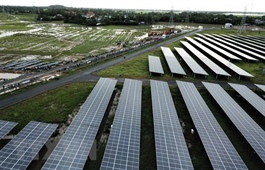Handicraft, wood industry sets bar high
Handicraft, wood industry sets bar high
The Handicraft and Wood Industry Association of HCM City said it plans several measures to add value to Viet Nam’s handicrafts and wood products, help its members further penetrate the global supply chain and enable Viet Nam to become a leading producer and exporter of quality, branded and reputed furniture and forestry products.

The association held its eighth congress last Friday to review its 2016-19 activities and make plans for 2020-23.
Nguyen Chanh Phuong, its deputy chairman and general secretary, said the association has organised many activities that have increased the reputation of the wood and forestry processing industry in both the domestic and international markets.
They included a conference on orientations for the rapidly growing industry attended by Prime Minister Nguyen Xuan Phuc, the ASEAN Market Attraction forum and launch of new exhibition VIFA GU and online exhibition platform HOPE, he listed.
The association also signed agreements with technology partners to embrace digital transformation for itself and members, which has opened new business opportunities and helped overcome the challenges posed by the Covid-19 pandemic, he said.
“But the woodworking industry also missed some opportunities. The industry is still more inclined towards outsourcing and labour intensive work and lacks a skilled workforce. Technology is used but not thoroughly. These are the things we must continue to encourage the wood industry to improve further.”
Talking about plans for the new term, Nguyen Quoc Khanh, HAWA chairman, said the association would continue to work with the Government to advocate sound policies, create business opportunities for its members through trade fairs and exhibitions and attract more members as well as increase their connectivity.
“The industry will work to meet the export target of US$20 billion by 2025 set by the Government, of which Vietnamese enterprises must account for 60-70 per cent.”
Attracting younger generations to the industry, helping members embrace technologies such as AI, VR and AR to take part in the global supply chain, encouraging firms to shift from OEM (original equipment manufacturers) to ODM (original design manufacturing), and developing products using unique materials to attain high profits are other targets, he said.
Adopting technology in all stages of the value chain such as R&D, distribution, new materials, services, forest development, and production would help businesses create competitive products and reduce production time, he pointed out.
With this five-year strategic vision, HAWA wants to make the wood and furniture industry attractive, improve profitability and value addition for the industry, develop a comprehensive supply chain, attract new investors, foster young entrepreneurs, and promote the Vietnamese furniture brand globally, he said.
Khanh unveiled three projects the association plans in the new term: a centre in Tay Ninh Province for start-up firms in the handicrafts and wood industry, the 150ha Bui Thanh Thuy Handicraft village in Dong Thap Province in collaboration with Novaland and a tie-up with the Vietnam Business and Investment Fast Track to help foreign businesses enter the country and link up with Vietnamese businesses.
HAWA has nearly 550 members in 25 cities and provinces.





















